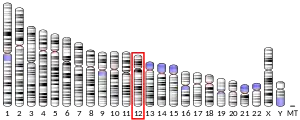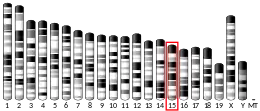Glycerol-3-phosphate dehydrogenase 1
Glycerol-3-phosphate dehydrogenase 1 is a protein that in humans is encoded by the GPD1 gene.[5]
Function
This gene encodes a member of the NAD-dependent glycerol-3-phosphate dehydrogenase family. The encoded protein plays a critical role in carbohydrate and lipid metabolism by catalyzing the reversible conversion of dihydroxyacetone phosphate (DHAP) and reduced nicotine adenine dinucleotide (NADH) to glycerol 3-phosphate (G3P) and NAD+.
The encoded cytosolic protein and mitochondrial glycerol-3-phosphate dehydrogenase also form a glycerol phosphate shuttle that facilitates the transfer of reducing equivalents from the cytosol to mitochondria.
Mutations in this gene are a cause of transient infantile hypertriglyceridemia. Alternatively spliced transcript variants encoding multiple isoforms have been observed for this gene.
References
- GRCh38: Ensembl release 89: ENSG00000167588 - Ensembl, May 2017
- GRCm38: Ensembl release 89: ENSMUSG00000023019 - Ensembl, May 2017
- "Human PubMed Reference:". National Center for Biotechnology Information, U.S. National Library of Medicine.
- "Mouse PubMed Reference:". National Center for Biotechnology Information, U.S. National Library of Medicine.
- "Entrez Gene: Glycerol-3-phosphate dehydrogenase 1". Retrieved 2017-03-23.
Further reading
- Gudayol M, Vidal J, Usac EF, Morales A, Fabregat ME, Fernández-Checa JC, Novials A, Gomis R (2001). "Identification and functional analysis of mutations in FAD-binding domain of mitochondrial glycerophosphate dehydrogenase in caucasian patients with type 2 diabetes mellitus". Endocrine. 16 (1): 39–42. doi:10.1385/ENDO:16:1:39. PMID 11822825. S2CID 30120853.
- Swierczynski J, Zabrocka L, Goyke E, Raczynska S, Adamonis W, Sledzinski Z (2003). "Enhanced glycerol 3-phosphate dehydrogenase activity in adipose tissue of obese humans". Mol. Cell. Biochem. 254 (1–2): 55–9. doi:10.1023/a:1027332523114. PMID 14674682. S2CID 25108711.
- Ou X, Ji C, Han X, Zhao X, Li X, Mao Y, Wong LL, Bartlam M, Rao Z (2006). "Crystal structures of human glycerol 3-phosphate dehydrogenase 1 (GPD1)". J. Mol. Biol. 357 (3): 858–69. doi:10.1016/j.jmb.2005.12.074. PMID 16460752.
- Park JJ, Berggren JR, Hulver MW, Houmard JA, Hoffman EP (2006). "GRB14, GPD1, and GDF8 as potential network collaborators in weight loss-induced improvements in insulin action in human skeletal muscle". Physiol. Genomics. 27 (2): 114–21. doi:10.1152/physiolgenomics.00045.2006. PMID 16849634.
- MacDonald MJ, Longacre MJ, Langberg EC, Tibell A, Kendrick MA, Fukao T, Ostenson CG (2009). "Decreased levels of metabolic enzymes in pancreatic islets of patients with type 2 diabetes". Diabetologia. 52 (6): 1087–91. doi:10.1007/s00125-009-1319-6. PMC 2903059. PMID 19296078.
- Krasnov GS, Oparina NIu, Khankin SL, Mashkova TD, Ershov AN, Zatsepina OG, Karpov VL, Beresten' SF (2009). "[Colorectal cancer 2D-proteomics: identification of altered protein expression]". Mol. Biol. (Mosk.) (in Russian). 43 (2): 348–56. doi:10.1134/s0026893309020186. PMID 19425502. S2CID 30196165.
- Guindalini C, Lee KS, Andersen ML, Santos-Silva R, Bittencourt LR, Tufik S (2010). "The influence of obstructive sleep apnea on the expression of glycerol-3-phosphate dehydrogenase 1 gene". Exp. Biol. Med. (Maywood). 235 (1): 52–6. doi:10.1258/ebm.2009.009150. PMID 20404019. S2CID 207194967.
- Basel-Vanagaite L, Zevit N, Har Zahav A, Guo L, Parathath S, Pasmanik-Chor M, McIntyre AD, Wang J, Albin-Kaplanski A, Hartman C, Marom D, Zeharia A, Badir A, Shoerman O, Simon AJ, Rechavi G, Shohat M, Hegele RA, Fisher EA, Shamir R (2012). "Transient infantile hypertriglyceridemia, fatty liver, and hepatic fibrosis caused by mutated GPD1, encoding glycerol-3-phosphate dehydrogenase 1". Am. J. Hum. Genet. 90 (1): 49–60. doi:10.1016/j.ajhg.2011.11.028. PMC 3257852. PMID 22226083.
- Joshi M, Eagan J, Desai NK, Newton SA, Towne MC, Marinakis NS, Esteves KM, De Ferranti S, Bennett MJ, McIntyre A, Beggs AH, Berry GT, Agrawal PB (2014). "A compound heterozygous mutation in GPD1 causes hepatomegaly, steatohepatitis, and hypertriglyceridemia". Eur. J. Hum. Genet. 22 (10): 1229–32. doi:10.1038/ejhg.2014.8. PMC 4169545. PMID 24549054.
This article incorporates text from the United States National Library of Medicine, which is in the public domain.



